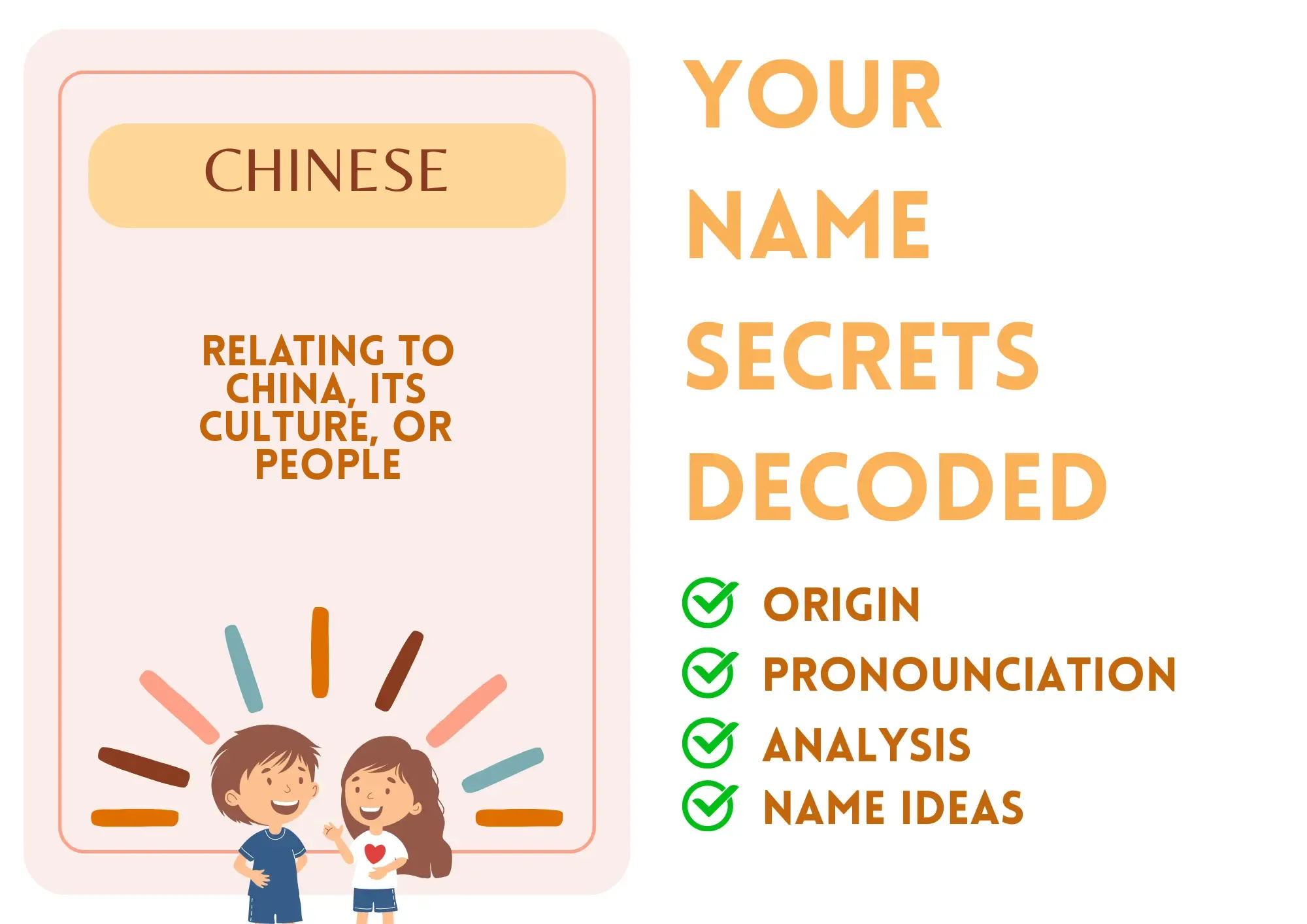
Chinese
Chinese can refer to a name associated with China's rich cultural heritage, though it is not commonly used as a personal name in the traditional sense. As a descriptor, it signifies anything related to the people, language, and culture of China. The term embodies the vast history, diverse regional identities, and unique philosophies central to Chinese civilization. It can encompass a variety of meanings depending on context, from the nation itself to cultural practices and philosophies.
While not typically used as a given name, it reflects the importance of heritage and identity, and parents might choose names from Chinese mythology or literature that resonate with other cultural connotations.
Basic Information
Gender: Unisex
Sounds Like: chih-nee
Pronunciation Explanation: The name is pronounced with a rising tone, with the first syllable 'chih' as in 'chip' and the second syllable 'nee' as in 'knee'.
Summary and Meaning
Meaning: Relating to China, its culture, or people
Origin: The term has its origins in the word 'China', derived from the Qin dynasty, and has evolved in various languages to refer to the people and culture of China.
Usage: The term is gender-neutral and can refer to individuals of any gender within the cultural context.
Name Number (Chaldean)
Name Number (Pythagorean)
Popularity (Global Rank)
Overall: 44668
Boys: 72681
Girls: 64276
Most Popular in
Religious and Cultural Significance
Religion: Buddhism/Daoism
Background: Influential religions in Chinese culture, with Buddhism focusing on spiritual enlightenment and Daoism emphasizing harmony with nature.
Cultural Significance: Chinese culture is recognized for its art, philosophy, martial arts, cuisine, and festivals, contributing to a rich tapestry of global heritage.
Historical Significance: The civilization has one of the world's longest and continuous histories, with profound contributions to philosophy, science, art, and governance.
Popular Culture
Literature and Mythology: Chinese mythology features numerous character names like the Dragon King and the goddess Nuwa, which reflect cultural values and beliefs.
Movies and Television: Characters embodying Chinese culture appear in films like 'Mulan', symbolizing bravery, honor, and cultural pride.
Feelings and Perceptions
Perception: The term 'Chinese' is often perceived positively, denoting a rich cultural legacy, though it may raise sensitivity regarding ethnic identity.
Positive Feelings: Cultural pride, rich heritage, artistic expression, historical depth.
Negative Feelings: Potential for stereotyping or cultural misunderstandings.
Practical Considerations
Ease of Writing and Calling: The term 'Chinese' is easy to write and pronounce in many languages, being a widely recognized descriptor.
Common Typos and Misspellings: Chinees,Chiniese,Cinese,Chinise
Common Nicknames:
Chinese Popularity
Chinese Usage and Popularity By Country
| Country | Rank (Overall) |
|---|---|
| Gambia | 1935 |
| Mauritius | 6749 |
| Pakistan | 8777 |
| Bangladesh | 9411 |
| Sri Lanka | 10816 |
| Ghana | 12389 |
| Niger | 13051 |
| Ukraine | 13157 |
| Russia | 14046 |
| Jamaica | 14609 |
Chinese Usage and Popularity By City
| City | Rank (Overall) |
|---|---|
| New Delhi | 5425 |
| Delhi | 6486 |
| Peking | 3424 |
| Gurgaon | 4241 |
| London | 19994 |
| Bengaluru | 14851 |
| Bombay | 16299 |
| Shanghai | 5895 |
| San Francisco | 15585 |
| Los Angeles | 17225 |